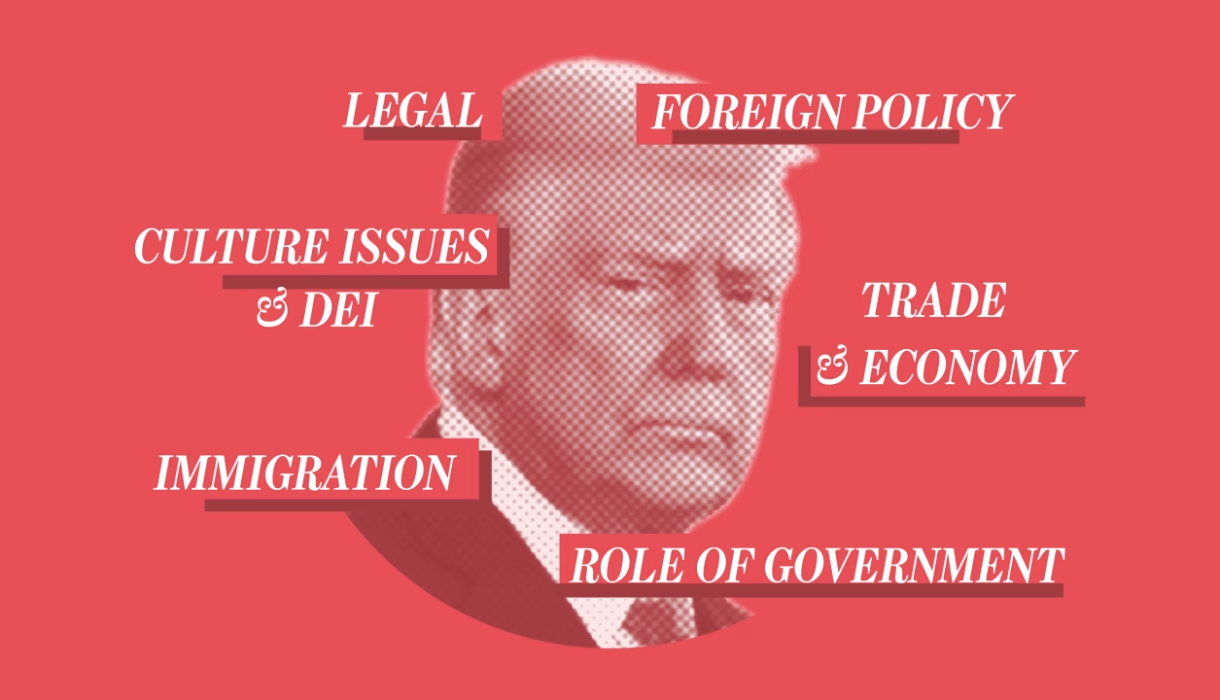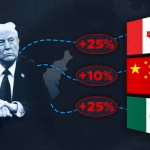
Challenging Presidential Tariffs: The Wall Street Journal’s Legal Warning to Trump
When I first read about the Wall Street Journal’s editorial calling for legal action against President Trump’s tariffs, I was struck by the weight of these words in a landscape dominated by bold political moves. It feels as if we’ve entered a game of high-stakes chess in the world of trade, with repercussions rippling across the board. The idea that tariffs can be deemed an overreach under established laws really got me thinking about where the boundaries of presidential power lie. Why is there such a push back, and what could it mean for the average American?
The Context of Trump’s Tariffs
When we think about trade, we often think about the flow of goods and services across borders. But sometimes, this flow gets interrupted. One significant interruption happened during President Trump’s administration when he imposed tariffs on Canada and Mexico. These tariffs were not just a simple change in policy; they stirred up a lot of controversy and debate.
Overview of Trump’s Tariffs on Canada and Mexico
In 2018, President Trump announced tariffs on steel and aluminum imports from Canada and Mexico. This decision was part of a broader strategy to protect American industries. But what does that really mean? Essentially, tariffs are taxes on imported goods. They make foreign products more expensive, encouraging consumers to buy domestic products instead.
- Steel and Aluminum Tariffs: The tariffs were set at 25% for steel and 10% for aluminum.
- Impact on Trade Relations: Canada and Mexico, both key trading partners, were understandably upset. They responded with their own tariffs on U.S. goods.
But why did Trump think this was necessary? Let’s dive into the rationale behind these tariffs.
The Rationale Behind Implementing Tariffs
Trump argued that these tariffs were essential for national security. He claimed that relying on foreign steel and aluminum made the U.S. vulnerable. But was this really about security, or was it about something else? Many critics believe it was more about politics than protection.
Tariffs can be a double-edged sword. As an economic analyst once said,
“Tariffs are a double-edged sword that can harm both sides of the equation.”
This means that while they might protect some American jobs, they can also lead to higher prices for consumers and retaliatory actions from other countries.
Historical Precedent of Tariffs in U.S. Trade Policy
Tariffs are not new in U.S. history. They have been used for various reasons over the years. For instance, during the Great Depression, the Smoot-Hawley Tariff Act raised duties on imports, which many economists believe worsened the economic downturn. History teaches us that tariffs can have unintended consequences.
In fact, the legality of Trump’s tariffs has been questioned. The Wall Street Journal even called for legal action against them, arguing that they require Congressional approval. This brings us to an important piece of legislation: the 1977 International Emergency Economic Powers Act (IEEPA). This act gives the president broad powers to regulate international commerce during a national emergency. But was the situation with Canada and Mexico truly an emergency?
Legal Challenges and Controversies
Previous instances where tariffs have been contested legally show that this is a complex issue. Courts have often had to balance the president’s authority with Congressional powers. The debate continues: should the president have the power to impose tariffs unilaterally? Or should Congress play a more significant role in trade policy?
As we explore these questions, it’s clear that tariffs are not just economic tools. They are also political instruments. The implications of Trump’s tariffs on Canada and Mexico extend far beyond trade. They touch on issues of sovereignty, legality, and international relations.
In the end, the controversy surrounding these tariffs is a reminder of how interconnected our world is. Trade policies can have ripple effects that impact not just economies, but also relationships between countries. And as we navigate these waters, it’s essential to consider all sides of the equation.
Wall Street Journal’s Position on Tariffs
The Wall Street Journal (WSJ) has taken a strong stance against tariffs, particularly those imposed by President Trump on Canada and Mexico. Their editorial board argues that these tariffs are not just economically questionable; they may also be illegal. This raises important questions about the balance of power in our government and the role of Congress in economic policy-making.
Key Points Against Tariffs
- Overreach of Power: The WSJ editorial board believes that tariffs without legislative backing are an overstep. This means that the president may be exceeding his authority by imposing these tariffs without proper approval from Congress.
- Legal Concerns: The board specifically cites the International Emergency Economic Powers Act (IEEPA) of 1977. They argue that Trump’s tariffs could be seen as a misuse of this act, which was designed for emergencies, not for routine trade disputes.
- Economic Impact: The tariffs have sparked retaliatory measures from countries like Canada and the EU, which have imposed their own tariffs on U.S. exports. This tit-for-tat scenario can lead to a trade war, which could hurt American businesses and consumers alike.
Arguments for Requiring Congressional Approval
One of the most compelling arguments made by the WSJ is the need for Congressional approval before implementing tariffs. Why is this important? Because tariffs can have far-reaching effects on the economy. They can raise prices for consumers, disrupt supply chains, and impact jobs. When such significant changes are made, it seems only fair that elected representatives, who are accountable to the public, should have a say.
Here are a few reasons why Congressional approval is crucial:
- Democratic Accountability: Congress is made up of representatives from various states and districts. They understand the local economies and can better assess the impact of tariffs on their constituents.
- Checks and Balances: The U.S. government is built on a system of checks and balances. Allowing the president to impose tariffs unilaterally undermines this system and could lead to abuses of power.
- Long-term Stability: Tariffs can create uncertainty in the market. When businesses don’t know what to expect, they may hesitate to invest or expand. Congressional approval can provide a more stable and predictable environment.
Implications of Governmental Overreach
The implications of allowing the executive branch to impose tariffs without Congressional oversight are significant. It raises the question: what other powers might the president claim without legislative approval? This could set a dangerous precedent, leading to further governmental overreach in other areas.
Moreover, the WSJ highlights the relationship between media and law in shaping economic policy. The influence of a major publication like the WSJ cannot be underestimated. Their critiques can sway public opinion and even impact policymakers. When they call for legal action against a sitting president, it sends a strong message about the importance of adhering to the rule of law.
“The editorial board believes that tariffs without legislative backing are an overstep.” – WSJ Editorial Board
In summary, the Wall Street Journal’s position on tariffs raises critical issues about legality, accountability, and the balance of power in our government. Their editorial serves as a reminder of the importance of legislative oversight in economic policy-making, especially when it comes to decisions that can significantly impact the American public.
As we navigate these complex issues, it’s essential to consider the broader implications of our economic policies and the role of our government in shaping them.
International Reactions to U.S. Tariff Policies
When the U.S. government imposes tariffs, it doesn’t just affect American businesses. It sends ripples through the global economy. Recently, Canada and the European Union (EU) have responded to U.S. tariffs with their own retaliatory measures. This situation raises many questions: How do these tariffs impact international relations? What products are being targeted? And what does this mean for global trade dynamics?
Overview of Retaliatory Tariffs
Canada and the EU have both taken significant steps in response to U.S. tariffs. They are not just sitting back and watching. Instead, they have implemented their own tariffs on American goods. This kind of back-and-forth is often referred to as a “trade war.” But what does that really mean for us?
- Canada: Canada has targeted various U.S. products, including steel and aluminum. They have also placed tariffs on consumer goods like whiskey and yogurt.
- European Union: The EU has focused on American exports such as motorcycles, bourbon, and peanut butter. These tariffs are designed to hit specific industries hard.
These retaliatory measures show how interconnected our economies are. When one country raises tariffs, it can lead to a domino effect. Countries retaliate, and soon, the global trade landscape is altered.
Examples of U.S. Exports Targeted by Tariffs
It’s essential to understand which U.S. exports are being affected. Here are some notable examples:
- Steel and Aluminum: These materials are crucial for various industries. Canada’s tariffs on these products have hit American manufacturers hard.
- Bourbon: This iconic American spirit has faced tariffs from the EU. It’s a blow to distilleries that rely on international sales.
- Motorcycles: Harley-Davidson, a symbol of American culture, has also been impacted. The EU’s tariffs on motorcycles have raised prices and affected sales.
These examples highlight the direct impact of tariffs on specific industries. But the effects go beyond just the products themselves. They also affect jobs, prices, and consumer choices.
Analysis of International Relations and Trade Response
The response from Canada and the EU is more than just a reaction to tariffs. It reflects a broader trend in international relations. Countries are becoming more protective of their own industries. This can lead to strained relationships. But why does this matter?
When countries engage in trade wars, it can lead to unnecessary economic pain for everyday citizens. As an International Trade Expert once said,
“Trade wars can lead to unnecessary economic pain for everyday citizens.”
This statement rings true. Increased tariffs can raise prices for consumers and reduce choices in the market.
Moreover, the historical consequences of trade disputes are significant. Looking back, we can see how trade wars have led to economic downturns. The Great Depression is a prime example. Tariffs were raised, and global trade suffered. Today, we must ask ourselves: Are we repeating history?
In conclusion, the international reactions to U.S. tariff policies are complex and multifaceted. Canada and the EU’s retaliatory tariffs demonstrate the interconnected nature of global trade. As we navigate these turbulent waters, it’s crucial to consider the broader implications for international relations and the economy as a whole.
The Economic Implications for the Average American
The topic of tariffs often feels distant, like a political debate happening far away from our daily lives. But the truth is, tariffs can have a profound impact on us, the average American. Let’s break down how these policies affect our wallets, jobs, and the economy as a whole.
How Tariffs Could Affect Prices of Everyday Goods
Have you ever noticed a sudden spike in the price of your favorite cereal or a can of soup? That might be due to tariffs. When the government imposes tariffs on imported goods, the cost often trickles down to consumers. Here’s how:
- Higher Prices: Importers face increased costs due to tariffs. They usually pass these costs onto consumers. So, when you’re at the grocery store, you might be paying more for basic items.
- Limited Choices: Tariffs can lead to fewer imports. This reduction can limit the variety of products available to consumers. Imagine walking into a store and finding your favorite brand missing.
- Inflation: As prices rise, the overall cost of living increases. This can squeeze household budgets, making it harder to afford everyday necessities.
As an example, I remember shopping last summer when the prices of certain imported goods jumped. I had to reconsider my shopping list. It was frustrating to see how quickly prices could change.
Potential Job Impacts in U.S. Industries
Tariffs don’t just affect prices; they can also impact jobs. Some industries may benefit, while others could suffer. Here’s a closer look:
- Job Creation in Certain Sectors: Tariffs can protect domestic industries from foreign competition. This might lead to job growth in those sectors. For instance, steel and aluminum industries may see a boost.
- Job Losses in Others: Conversely, industries reliant on imported materials may face challenges. If costs rise, companies might cut jobs to maintain profits. This can lead to layoffs in sectors like manufacturing or retail.
- Economic Displacement: Workers in affected industries may struggle to find new jobs. The transition can be tough, especially for those who have spent years in their roles.
When I spoke with a friend who works in manufacturing, he expressed concerns about job security. He mentioned that the uncertainty around tariffs made it hard to plan for the future.
Long-Term Economic Outlook Based on Current Trade Policies
Looking ahead, the long-term economic outlook is uncertain. Current trade policies can shape the future in significant ways. Here are a few considerations:
- Trade Wars: Ongoing trade disputes can lead to retaliatory tariffs. This back-and-forth can create instability in the market.
- Global Relationships: Tariffs can strain relationships with other countries. This could impact future trade agreements, which are crucial for economic growth.
- Consumer Confidence: If consumers feel uncertain about the economy, they may cut back on spending. This can lead to slower economic growth.
As an economic policy professor once said,
“Every increase in tariffs is felt by families at the checkout line.”
This statement rings true. The effects of tariffs are not just numbers on a chart; they are real experiences for families across the country.
The conversation about tariffs often centers around macroeconomic factors, but it’s the individual consumers who feel the real-time effects on their wallets and jobs. Understanding these implications is crucial for all of us.
Future of U.S. Trade Policy and the Law
The landscape of U.S. trade policy is changing rapidly. With the current administration’s approach to tariffs, we are witnessing a series of legal challenges that could reshape the future of trade. But what does this mean for us? Let’s dive into the potential legal challenges to tariffs, the role of Congress, and the implications for our relationships with Canada and Mexico.
Exploring Potential Legal Challenges to Tariffs
Tariffs have been a hot topic lately. They can protect domestic industries but also lead to international disputes. Recently, the Wall Street Journal called for legal action against President Trump’s tariffs on Canada and Mexico. Why? They argue that these tariffs require Congressional approval. This is a significant point. If tariffs are deemed an overreach of power, it could set a legal precedent that limits executive authority in trade matters.
Legal experts are watching closely. The 1977 International Emergency Economic Powers Act (IEEPA) is often cited in these discussions. It grants the president broad powers during national emergencies. However, critics argue that using it for tariffs is a stretch. If courts agree, we might see a shift in how trade policies are implemented.
The Role of Congress in Trade Decisions Moving Forward
Congress has a critical role in shaping trade policy. Historically, they have the power to regulate commerce with foreign nations. Yet, recent events show a trend of executive overreach. This raises questions: Should Congress reclaim its authority? Will they step in to challenge the administration’s decisions?
As we look to the future, it’s clear that Congress may need to take a more active role. They could introduce legislation that clarifies the limits of executive power regarding tariffs. This could lead to a more balanced approach to trade policy, ensuring that both branches of government have a say. After all, trade impacts everyone, from businesses to consumers.
Future Implications for U.S.-Canada-Mexico Relations
The relationship between the U.S., Canada, and Mexico is crucial. These countries are not just neighbors; they are key trading partners. The ongoing tariff disputes have already led to retaliatory measures. Canada and the EU have imposed tariffs on U.S. exports, which can hurt American businesses.
What does this mean for the future? If legal challenges to tariffs succeed, we might see a thaw in relations. Conversely, if tariffs remain in place, tensions could escalate. It’s a delicate balance. The next few years will be critical in defining U.S. trade relationships and legal precedents. As a trade policy analyst noted, “The next few years will be critical in defining U.S. trade relationships and legal precedents.”
Thoughts on Reshaping American Politics
As we navigate these changes, it’s essential to consider the broader implications. Trade policy is not just about economics; it’s also about politics. Legal battles over tariffs could reshape American politics. They might lead to new alliances or divisions within Congress. This could impact future elections and the overall political landscape.
Predictions on how trade policies might evolve are varied. Some experts believe we will see a return to more collaborative approaches, while others fear a rise in protectionism. Whatever the outcome, it’s clear that the future of U.S. trade policy is uncertain.
In conclusion, the future of U.S. trade policy is at a crossroads. Legal challenges to tariffs, the role of Congress, and the implications for our relationships with Canada and Mexico are all intertwined. As we move forward, it’s vital to stay informed and engaged. The decisions made today will shape our economic landscape for years to come. Let’s keep the conversation going and advocate for a balanced approach to trade that benefits everyone.
TL;DR: The Wall Street Journal’s editorial urging legal action against Trump’s tariffs highlights significant implications for American trade policy, questioning the president’s authority and sparking debates on international economic relations.
Trump tariffs, Wall Street Journal, IEEPA, trade war, U.S. trade policy, legal overreach, Canada tariffs, Mexico tariffs, presidential authority, economic impact

